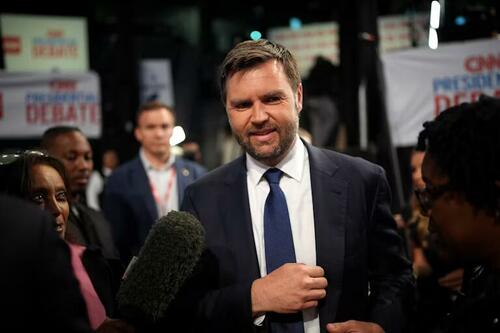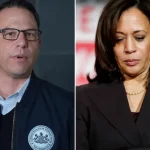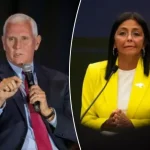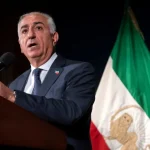
Authored by Philip Wegmann & Susan Crabtree via RealClearPolitics,
Republicans have nominated a hillbilly for vice president. This, by his own admission.
Ohio Sen. J.D. Vance is the author of “Hillbilly Elegy,” a New York Times bestseller. He is also a United States Marine who graduated from Ohio State University and, later, Yale Law School by way of the GI Bill, using the veteran benefit to ascend from the Rust Belt, where he has said poverty was a birthright, to Silicon Valley, where his financial disclosure forms reveal that he made a small fortune, and from there to the U.S. Senate.
Vance, only 39, has lived the American Dream in a hurry, a life portrayed in a biopic directed by Oscar-winning director Ron Howard, no less. Now he writes the next chapter of his life, and American history, as the vanguard of a populist conservatism entirely unconcerned with the niceties of long-established GOP orthodoxy.
He may well be the Republican future, one not entirely welcomed by the old guard. All the same, or perhaps as a result, Vance is a man after Donald Trump’s own heart.
The former president and presumptive three-time Republican presidential nominee announced Monday that Vance would join him atop the ticket, saying his new No. 2 would focus on the voters “he fought so brilliantly for” in the Senate, namely “the American Workers and Farmers.” The junior senator from Ohio has served in that body for all of a year and a half.
What Vance lacks in legislative experience, he has made up for in energy. He loves the tariff and the union. He loathes the corporate tax cut and the global corporation. He is very “anti-woke.” The Buckeye also does not fear Big Government in the same way many of his more business-friendly colleagues do, a fact that makes him a star of “the New Right.”
A Trump-Vance administration, said Oren Cass, an intellectual godfather of the movement, means “a working-class conservatism that emphasizes the importance of family, community, and industry to the nation’s liberty and prosperity.”
Vance means change, a transformation in personnel as much as policy. This much was on display Monday when Mitch McConnell arrived at the Republican National Convention here. The Senate minority leader, the legislature most responsible for landmark tax cuts and a conservative Supreme Court, rose to pledge the votes of the Kentucky delegation to Trump. He was booed.
“A lot of Senate Republicans have presided over the decline of their own country, and they're unable to look themselves in the mirror and admit failure,” Vance told RealClearPolitics in an interview earlier this year. On his way to stump for Trump in New Hampshire at the time, Vance argued that it was time the elderly establishment “use their remaining years in public life to support an agenda that gets the country back on track.”
The most profound difference? Foreign policy. He told RCP earlier this year that the Biden administration was “deceiving the American people” about the financial and human cost of the war in Ukraine. “I gotta be honest with you,” he told Steve Bannon before the Russian invasion. “I don’t really care what happens to Ukraine one way or another.” His concern? “The fact that in my community right now, the leading cause of death among 18–45-year-olds is Mexican fentanyl.”
This strict kind of America First thinking is unpopular among many traditional Republicans, especially those of the neoconservative variety. Vance is neither.
Each of the major vice presidential contenders traveled to Atlanta last month for the first presidential debate, gathering at the home of former Georgia Sen. Kelly Loeffler before boarding a bus to the venue. It was the first time they were collected in one spot. After three glasses of wine the night before, Vance said he was hungover.
The millennial Senator joked with the much older passengers, all of them gunning to be the next vice president, that “age has caught up with me.” Everyone laughed. According to a source with direct knowledge, Vance then pivoted from self-deprecation to theology, turning to Florida Sen. Marco Rubio for an esoteric conversation about the schisms inside the Catholic Church.
A spokesman for Vance did not dispute those events.
While fluency in the plight of the white working class first made Vance famous, he joined the ranks of the elite after law school and especially in the aftermath of the 2016 election. Elites, particularly liberal ones on the two coasts, could not fathom how a celebrity billionaire had just defeated Hillary Clinton. A product of the white working class, Vance volunteered as a guide, and through his memoir of life in Appalachia, he provided a picture of alienation, poverty, and drug addiction in middle America made worse by polarization and deindustrialization.
He was a celebrity, albeit a decidedly anti-Trump one. He quipped to Terry Gross during an NPR interview in 2016 that he couldn’t vote for Trump and wouldn’t vote for Clinton. “I might write in my dog,” he said, “because that's about as good as it seems.”
“Everybody loved me back then,” Vance said in an interview with Russ Douthat. His conversion came at an event hosted by the Business Roundtable. An unnamed CEO was complaining about the cost of wages after Trump’s immigration crackdown, Vance told the New York Times columnist, when he turned to the author from Appalachia.
“Well, you understand this as well as anybody,” Vance recalled the businessman saying. “These people just need to get off their asses, come to work, and do their job.” He recoiled at the suggestion that he was “sympathetic” to the inhumane calculus. The only solution: “Alienating and offending people who liked my book.”
Vance alienated plenty, running a hard-nosed, America-first campaign on his way to the Senate. The venture capitalist regularly rails against the political elite who lack empathy and whose policies, he believes, harm the forgotten man. “There are a lot of people with cushy positions who have made a lot of money off the decline of this country who don't like him,” the senator told RCP in Atlanta, “but I think that their lack of endorsement is the best endorsement for Donald Trump.”
He entered politics as an anti-Trump pundit. He came to Congress a MAGA disciple with the endorsement of the former president, a development reportedly facilitated by libertarian billionaire Peter Thiel. Vance had criticized Trump publicly, but after a correspondence and dinner in 2021, the former president took a shine to the populist with an Ivy League diploma.
Advisors urged him not to make a big deal out of the Yale Law degree, Trump admitted during a 2022 rally in Vandalia, Ohio. “Well, yeah, he’s elite! He’s elite in intelligence,” Trump said riling up the crowd, and that’s what we want, right? He will bring the toughness and intellectual firepower we need to champion our movement.
More important than brains? Loyalty. “J.D. will never be owned by the establishment,” Trump bellowed. Then, an unscripted aside: “He won’t be owned by me either, unfortunately.” The former president said of the man he would pick as his running mate two years later, “I'd love to own the guy, but I don't think he’ll be there for me.” Vance, he explained, was “a very independent guy.”
But Vance turned out to be loyal. Very loyal. Once in the Senate, He embraced the Trump agenda while Trump remained in a sort of exile, advanced the argument that the 2020 election was rigged, and endorsed the former president early when the 2024 GOP field was still crowded. Vance told RCP earlier this year, “I wish Donald Trump wasn’t term-limited,” explaining that four years of Trump was preferable to eight of any other Republican.
The independence Trump bellowed about in Ohio remained. It is manifest in his willingness to buck the old ways, and has made Vance an anathema to more traditionally conservative voices. If Vance’s praise of FTC Commissioner Lina Kahn’s aggressive use of anti-trust law to police corporations made them raise an eyebrow, his embrace of industrial policy makes their skin crawl.
Washington Post columnist George Will reacted to news that Vance would be joining the ticket by calling him “the serrated edge of MAGA politics.” David French of the New York Times, meanwhile, saw something more sinister, writing that “Trump has impulses, whereas Vance has an ideology” and worrying that Vance would “create something coherent out of MAGA’s concerns and MAGA’s grievances.” Phil Klein of National Review declared that with his VP pick, Trump has pounded another “nail in the coffin for Reagan Republicanism.”
Vance is no insurgent, argues Ryan James Girdusky, a populist-minded operative who advised a pro-Vance super PAC during the 2022 Senate race. Instead, he follows in the footsteps of a different set of conservatives: President Calvin Coolidge, the late Ohio Senator Robert Taft, and failed presidential candidate Pat Buchanan. Like Vance, Girdusky said, all of them “supported protecting American industry from foreign regimes, measured immigration levels, and a foreign policy that doesn’t seek to be the world’s policemen.”
How did Vance muscle past governors, more senior senators, and at least one ambassador? Simple, said Tucker Carlson, who sat next to Vance and the Trump family in the former president’s box on the first night of the convention. “He was the one VP contender who actually agreed with Trump on the big issues,” the former Fox News host told RCP. “That seemed significant.”
Outside the convention hall, delegates gushed, not about the policy views of the newly announced nominee, but about his biography.
Robert Lawson, a former Marine and current Missouri delegate in his 70s, said he was thrilled with Vance because “he has a very good background, has the education, served in the Armed Services, and I think he has a big heart for the United States.”
Jo Broughton, a 73-year-old delegate from Ohio, said it was wonderful to have a fellow Buckeye on the ballot. “He’s come such a long way from his humble beginnings,” she said, referring to “a rough life growing up” defined by an absent mother in the throes of addiction. “I think that gives him perspective as to what happens in America and how families have troubles,” she continued, “and I think he’s going to do everything he can to help people.”
Trump now hopes the Midwestern son can deliver the rustbelt from which he came. Vance grew up in Middletown, Ohio, a steel town unbolted by deindustrialization and smelted by globalization. It could easily serve as ground zero for American carnage, and three years before entering politics, he told RCP he did not think “most coastal Democrats care enough, or have enough empathy, for what’s going on in the heartland to turn it into a font of votes.”
Turning that region into a MAGA well-spring will be his immediate task as Vance works to return Trump to the White House. And then, perhaps Vance will carry the populist torch forward once Trump is gone.
Authored by Philip Wegmann & Susan Crabtree via RealClearPolitics,
Republicans have nominated a hillbilly for vice president. This, by his own admission.
Ohio Sen. J.D. Vance is the author of “Hillbilly Elegy,” a New York Times bestseller. He is also a United States Marine who graduated from Ohio State University and, later, Yale Law School by way of the GI Bill, using the veteran benefit to ascend from the Rust Belt, where he has said poverty was a birthright, to Silicon Valley, where his financial disclosure forms reveal that he made a small fortune, and from there to the U.S. Senate.
Vance, only 39, has lived the American Dream in a hurry, a life portrayed in a biopic directed by Oscar-winning director Ron Howard, no less. Now he writes the next chapter of his life, and American history, as the vanguard of a populist conservatism entirely unconcerned with the niceties of long-established GOP orthodoxy.
He may well be the Republican future, one not entirely welcomed by the old guard. All the same, or perhaps as a result, Vance is a man after Donald Trump’s own heart.
The former president and presumptive three-time Republican presidential nominee announced Monday that Vance would join him atop the ticket, saying his new No. 2 would focus on the voters “he fought so brilliantly for” in the Senate, namely “the American Workers and Farmers.” The junior senator from Ohio has served in that body for all of a year and a half.
What Vance lacks in legislative experience, he has made up for in energy. He loves the tariff and the union. He loathes the corporate tax cut and the global corporation. He is very “anti-woke.” The Buckeye also does not fear Big Government in the same way many of his more business-friendly colleagues do, a fact that makes him a star of “the New Right.”
A Trump-Vance administration, said Oren Cass, an intellectual godfather of the movement, means “a working-class conservatism that emphasizes the importance of family, community, and industry to the nation’s liberty and prosperity.”
Vance means change, a transformation in personnel as much as policy. This much was on display Monday when Mitch McConnell arrived at the Republican National Convention here. The Senate minority leader, the legislature most responsible for landmark tax cuts and a conservative Supreme Court, rose to pledge the votes of the Kentucky delegation to Trump. He was booed.
“A lot of Senate Republicans have presided over the decline of their own country, and they’re unable to look themselves in the mirror and admit failure,” Vance told RealClearPolitics in an interview earlier this year. On his way to stump for Trump in New Hampshire at the time, Vance argued that it was time the elderly establishment “use their remaining years in public life to support an agenda that gets the country back on track.”
The most profound difference? Foreign policy. He told RCP earlier this year that the Biden administration was “deceiving the American people” about the financial and human cost of the war in Ukraine. “I gotta be honest with you,” he told Steve Bannon before the Russian invasion. “I don’t really care what happens to Ukraine one way or another.” His concern? “The fact that in my community right now, the leading cause of death among 18–45-year-olds is Mexican fentanyl.”
This strict kind of America First thinking is unpopular among many traditional Republicans, especially those of the neoconservative variety. Vance is neither.
Each of the major vice presidential contenders traveled to Atlanta last month for the first presidential debate, gathering at the home of former Georgia Sen. Kelly Loeffler before boarding a bus to the venue. It was the first time they were collected in one spot. After three glasses of wine the night before, Vance said he was hungover.
The millennial Senator joked with the much older passengers, all of them gunning to be the next vice president, that “age has caught up with me.” Everyone laughed. According to a source with direct knowledge, Vance then pivoted from self-deprecation to theology, turning to Florida Sen. Marco Rubio for an esoteric conversation about the schisms inside the Catholic Church.
A spokesman for Vance did not dispute those events.
While fluency in the plight of the white working class first made Vance famous, he joined the ranks of the elite after law school and especially in the aftermath of the 2016 election. Elites, particularly liberal ones on the two coasts, could not fathom how a celebrity billionaire had just defeated Hillary Clinton. A product of the white working class, Vance volunteered as a guide, and through his memoir of life in Appalachia, he provided a picture of alienation, poverty, and drug addiction in middle America made worse by polarization and deindustrialization.
He was a celebrity, albeit a decidedly anti-Trump one. He quipped to Terry Gross during an NPR interview in 2016 that he couldn’t vote for Trump and wouldn’t vote for Clinton. “I might write in my dog,” he said, “because that’s about as good as it seems.”
“Everybody loved me back then,” Vance said in an interview with Russ Douthat. His conversion came at an event hosted by the Business Roundtable. An unnamed CEO was complaining about the cost of wages after Trump’s immigration crackdown, Vance told the New York Times columnist, when he turned to the author from Appalachia.
“Well, you understand this as well as anybody,” Vance recalled the businessman saying. “These people just need to get off their asses, come to work, and do their job.” He recoiled at the suggestion that he was “sympathetic” to the inhumane calculus. The only solution: “Alienating and offending people who liked my book.”
Vance alienated plenty, running a hard-nosed, America-first campaign on his way to the Senate. The venture capitalist regularly rails against the political elite who lack empathy and whose policies, he believes, harm the forgotten man. “There are a lot of people with cushy positions who have made a lot of money off the decline of this country who don’t like him,” the senator told RCP in Atlanta, “but I think that their lack of endorsement is the best endorsement for Donald Trump.”
He entered politics as an anti-Trump pundit. He came to Congress a MAGA disciple with the endorsement of the former president, a development reportedly facilitated by libertarian billionaire Peter Thiel. Vance had criticized Trump publicly, but after a correspondence and dinner in 2021, the former president took a shine to the populist with an Ivy League diploma.
Advisors urged him not to make a big deal out of the Yale Law degree, Trump admitted during a 2022 rally in Vandalia, Ohio. “Well, yeah, he’s elite! He’s elite in intelligence,” Trump said riling up the crowd, and that’s what we want, right? He will bring the toughness and intellectual firepower we need to champion our movement.
More important than brains? Loyalty. “J.D. will never be owned by the establishment,” Trump bellowed. Then, an unscripted aside: “He won’t be owned by me either, unfortunately.” The former president said of the man he would pick as his running mate two years later, “I’d love to own the guy, but I don’t think he’ll be there for me.” Vance, he explained, was “a very independent guy.”
But Vance turned out to be loyal. Very loyal. Once in the Senate, He embraced the Trump agenda while Trump remained in a sort of exile, advanced the argument that the 2020 election was rigged, and endorsed the former president early when the 2024 GOP field was still crowded. Vance told RCP earlier this year, “I wish Donald Trump wasn’t term-limited,” explaining that four years of Trump was preferable to eight of any other Republican.
The independence Trump bellowed about in Ohio remained. It is manifest in his willingness to buck the old ways, and has made Vance an anathema to more traditionally conservative voices. If Vance’s praise of FTC Commissioner Lina Kahn’s aggressive use of anti-trust law to police corporations made them raise an eyebrow, his embrace of industrial policy makes their skin crawl.
Washington Post columnist George Will reacted to news that Vance would be joining the ticket by calling him “the serrated edge of MAGA politics.” David French of the New York Times, meanwhile, saw something more sinister, writing that “Trump has impulses, whereas Vance has an ideology” and worrying that Vance would “create something coherent out of MAGA’s concerns and MAGA’s grievances.” Phil Klein of National Review declared that with his VP pick, Trump has pounded another “nail in the coffin for Reagan Republicanism.”
Vance is no insurgent, argues Ryan James Girdusky, a populist-minded operative who advised a pro-Vance super PAC during the 2022 Senate race. Instead, he follows in the footsteps of a different set of conservatives: President Calvin Coolidge, the late Ohio Senator Robert Taft, and failed presidential candidate Pat Buchanan. Like Vance, Girdusky said, all of them “supported protecting American industry from foreign regimes, measured immigration levels, and a foreign policy that doesn’t seek to be the world’s policemen.”
How did Vance muscle past governors, more senior senators, and at least one ambassador? Simple, said Tucker Carlson, who sat next to Vance and the Trump family in the former president’s box on the first night of the convention. “He was the one VP contender who actually agreed with Trump on the big issues,” the former Fox News host told RCP. “That seemed significant.”
Outside the convention hall, delegates gushed, not about the policy views of the newly announced nominee, but about his biography.
Robert Lawson, a former Marine and current Missouri delegate in his 70s, said he was thrilled with Vance because “he has a very good background, has the education, served in the Armed Services, and I think he has a big heart for the United States.”
Jo Broughton, a 73-year-old delegate from Ohio, said it was wonderful to have a fellow Buckeye on the ballot. “He’s come such a long way from his humble beginnings,” she said, referring to “a rough life growing up” defined by an absent mother in the throes of addiction. “I think that gives him perspective as to what happens in America and how families have troubles,” she continued, “and I think he’s going to do everything he can to help people.”
Trump now hopes the Midwestern son can deliver the rustbelt from which he came. Vance grew up in Middletown, Ohio, a steel town unbolted by deindustrialization and smelted by globalization. It could easily serve as ground zero for American carnage, and three years before entering politics, he told RCP he did not think “most coastal Democrats care enough, or have enough empathy, for what’s going on in the heartland to turn it into a font of votes.”
Turning that region into a MAGA well-spring will be his immediate task as Vance works to return Trump to the White House. And then, perhaps Vance will carry the populist torch forward once Trump is gone.
Loading…





